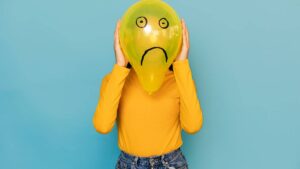Is our obsession with health driving us to chemophobia?

While it's smart to watch what you eat, focusing too much on the chemicals in our food can lead to overblown fears. Pic: Getty Images.
We’re all just trying to be as healthy as we can in the name of longevity, but consuming too much health content can quickly lead to a fear of chemicals altogether. But is it even possible to truly go ‘chemical free’?
Words by Sarah Mitchell for BodyandSoul.com.au.
‘No nasties’, ‘non-toxic’, ‘natural’, ‘organic’, ‘mineral’ – there are a multitude of health buzzwords sprinkled through grocery store shelves aimed to conjure up images of wellness and protection from ‘bad chemicals’.
The demonisation of synthetic ingredients isn’t anything new. For as long as there has been diet culture, we’ve been sold the idea that natural is always best (except for when it comes to sugar, in which case we jump to try any low-calorie alternative we’re sold).
While we’re all well aware that we shouldn’t take health or diet advice from social media, our feeds are so full of warnings about the dangers of seed oils, chemical sunscreens, pesticides, deodorants, receipts, additives and synthetic ingredients that we end up unable to remember if we got our information from an expert or our screens.
The news throughout our feeds is already so grim and fear-mongering, but now the wellness world’s content is driving us to fear chemicals, too.
What is chemophobia?
“Chemophobia is an irrational fear of compounds perceived as being synthetic,” chemistry teacher, author and blogger James Kennedy told Nine Honey. “Essentially, chemophobia relies upon a false belief that all ‘natural’ things are good for you, and that all ‘synthetic’ things are bad for you.”
The fear of ‘unhealthy’ or ‘toxic’ chemicals can drive people to swap out their beauty, cleaning, hygiene and food products for ‘clean’ alternatives in the hopes of protecting their health and hormones.
The mineral sunscreen movement
In the last couple of years, sunscreen has been the face of the chemical vs natural debate. Mineral sunscreen has been sold as the ‘healthier’ product option, and people are so dedicated to remaining ‘chemical free’ that claims of ‘sunscreen doping’ are now making headlines.

Eliciting images of athletes cheating via performance enhancers, the phrase is being thrown around amid talk about some mineral sunscreens aren’t 100 per cent mineral, with other chemicals sprinkled into ingredient lists.
But are chemicals inherently something we want to avoid anyway?
Is natural really always best?
Professor Mick Sherburn from ANU’s Research School of Chemistry tells Body+Soul it’s not the chemical label we should be paying attention to, but the dosage.
“Toxicologists remind us that the dose makes the poison,” he says. “No substance is inherently safe or dangerous – it’s the amount that matters. Vitamins are essential in small quantities, yet harmful in excess. Even water, essential for life, becomes dangerous when overconsumed.”

Can our bodies even tell the difference?
We’re encouraged by wellness influencers to make the clean swap to protect our bodies, but can they even tell when you’re using an expensive clean product over a cheaper ‘chemical’ option?
“Our bodies don’t recognise a label of ‘natural’ or ‘synthetic.’ They respond to the molecule itself – its structure, its chemistry, its dose”, the professor says. “Vitamin C from an orange and vitamin C from a factory are indistinguishable once inside us. And some of the most dangerous poisons known are entirely natural, while many synthetic compounds are safe and useful. The distinction is cultural, not chemical.”
“‘Synthetic’ does not automatically mean harmful, and ‘natural’ does not automatically mean safe. Some of the most lethal toxins known come straight from nature, while many synthetic compounds are safe and life-saving,” he adds.
Going ‘chemical-free’ is quite literally impossible
While the word often makes us think of something similar to the glowing green liquid from The Simpsons, chemicals make up everything.
“Chemicals are everywhere – air, water, food, even our own bodies are made of them. It is impossible to eliminate chemicals from our lives, because chemicals – by definition – constitute everything that has physical substance,” Sherburn says. “That’s why the phrase “chemical-free” makes no scientific sense.”

So, why the push to fear everyday products?
The expert says it’s important to realise that “Big Pharma and wellness influencers are often cast as opposites, but they share two essential traits: both claim to improve health, and both aim to profit from it. The difference lies in process and accountability.”
“Pharmaceutical companies spend heavily on research, are bound by strict regulation, and must demonstrate safety and efficacy before their products reach the market. Wellness influencers operate with few constraints, often selling anecdotes and hype as if they were evidence. Both, however, are commercial ventures, and both trade on the promise of better health.”
Take this as your sign to save yourself some money and source your information from reputable sources before you replace your entire beauty cupboard and kitchen pantry.
This article first appeared in bodyandsoul.com.au as Is our obsession with health driving us to chemophobia?
Related Topics

UNLOCK INSIGHTS
Discover the untold stories of emerging ASX stocks.
Daily news and expert analysis, it's free to subscribe.
By proceeding, you confirm you understand that we handle personal information in accordance with our Privacy Policy.








